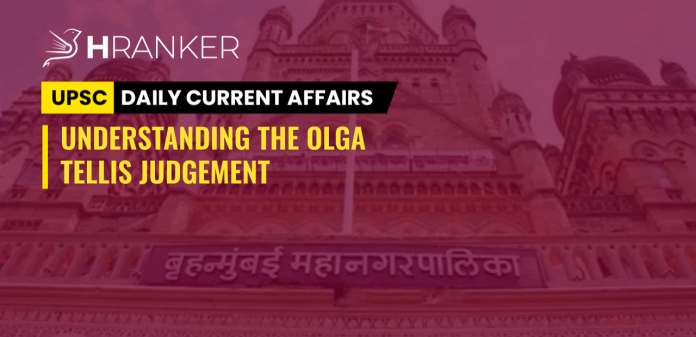WHAT’S IN NEWS:
The north delhi MCD officials ran havoc in Jahangirpuri area of New Delhi on 19th april starting a sudden anti-encroachment drive against the rioters of Hanuman Jayanti incident, that led to the demolition of shops. That has left the dwellers fearing that the next target will be their houses. In this context, the Olga Tellis judgment may become a game-changer in the case.
QUESTIONS DISCUSSED BEFORE THE COURT IN THE OLGA TELLIS CASE:
- One of the main questions was whether eviction of a pavement dweller would amount to depriving him/her of their livelihood guaranteed under Right to life in Article 21 of the constitution.
- The Article mandates that “no person shall be deprived of his life or personal liberty except according to the procedure established by law. This precedence was set by the supreme court during the Menaka Gandhi case in 1967.
- The bench was also asked to determine if provisions in the Bombay Municipal Corporation Act, 1988, allowing removal of encroachments without prior notice, were arbitrary and unreasonable.
- The court also decided to examine the question as to whether it was constitutionally impermissible to characterise the pavement dwellers as trespassers.
OLGA TELLIS JUDGEMENT:
In the Olga Tellis vs Bombay Municipal Corporation, 1985 case, a five judge bench led by the chief justice of India YV Chandrachud said that even though they agree that pavement dwellers do occupy public places unauthorised while living on footpaths, they cannot be considered similar to trespassers and they do so out of sheer helplessness and not with the objective of offending, intimidating, insulting or annoying anyone.
Henceforth, the court maintained that they should be given a chance to be heard and a reasonable opportunity should be given to depart before “force is used to expel them”.
STATE GOVERNMENT’S DEFENCE:
- The state government and the corporation countered that pavement dwellers should be estopped (estoppel is a judicial device whereby a court may prevent or estop a person from making assertions. Estopel may prevent a person from bringing a particular claim from contending that the shacks constructed by them on the pavements cannot be demolished because of their right to livelihood.
- They cannot claim any fundamental right to encroach and put up huts on pavements or public roads over which the public has “right of way”.
SUPREME COURT’S OBSERVATIONS:
- The bench threw out the government’s argument of estoppel saying that there can be no estoppel against the constitution. It reasoned that eviction using unreasonable force, without giving proper chance to explain is unconstitutional. Pavement dwellers too have right to dignity and life. The right to livelihood is an integral component of right to life. They can come to court to assert their right.
- If the right to livelihood is not treated as a part of constitutional right to live, the easiest way of depriving a person of his right to life would be to deprive him if his means of livelihood to the point of abrogation.
- A welfare state and its authorities should not use its powers of eviction as a means to deprive pavement dwellers of their livelihood.
- On the question of statutory provisions allowing authorities to remove encroachments without prior notice, it said that the provision was arbitrary and such powers were designed to operate as an exception and not as a general rule.
- The eviction procedure should follow principles of natural justice like giving the other side an opportunity to be heard and making the decision making process more participatory.
- The court noted that the encroachments were not done by choice but were involuntary acts driven by inevitable circumstances. Even trespassers should not be evicted by using force greater than what is reasonable and appropriate.
ARTICLE 21:
No person shall be deprived of his life or personal liberty except according to procedure established by law.
This right has been held to be the heart of the Constitution, the most organic and progressive provision in our living constitution, the foundation of our laws.
Article 21 can only be claimed when a person is deprived of his life or personal liberty by the State as defined in Article 12. Violation of the right by private individuals is not within the preview of Article 21.
Article 21 uses three crucial expressions, those are listed below:
- Right to life, and
- Right to personal liberty.
- Procedure established by law
Some of the rights that come under the Right to Life include:
- Right to livelihood.
- Right to privacy.
- Right to shelter.
- Right to health.
- Right to free legal aid.
- Right to speedy trial.
- Right to travel abroad.
- Right against boded labour.
- Right to fair trial.
- Right to information.




